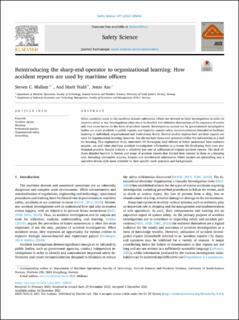Reintroducing the sharp-end operator to organizational learning: How accident reports are used by maritime officers
Peer reviewed, Journal article
Published version

Åpne
Permanent lenke
https://hdl.handle.net/11250/2990153Utgivelsesdato
2021Metadata
Vis full innførselSamlinger
Originalversjon
10.1016/j.ssci.2021.105632Sammendrag
When accidents occur in the maritime domain substantial efforts are devoted to their investigations in order to improve safety at sea. Investigations often result in detailed and elaborate descriptions of the sequence of events and root cause factors in the form of accident reports. Investigations carried out by governmental investigative bodies are made available in public reports, and typically contain safety recommendations intended to facilitate learning at individual, organizational and institutional levels. Several studies explore how accident reports are used for organizational learning, however, less discuss how sharp-end operators utilize this information as a tool for learning. This exploratory study interviews 18 Norwegian deck officers to better understand how seafarers acquire, use and value maritime accident investigation information as a means for developing their own professional practice. Results indicate a relatively low rate of utilization of original accident reports. The deck officers detailed barriers in format and scope of accident reports that limited their interest in them as a learning tool, favouring alternative sources, formats and transformed information which focuses on storytelling and a narrative-driven style more relatable to their specific work practices and backgrounds.
